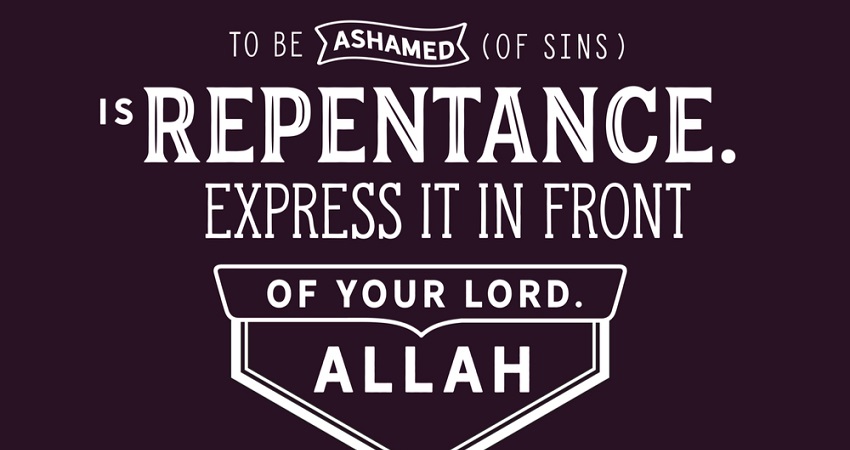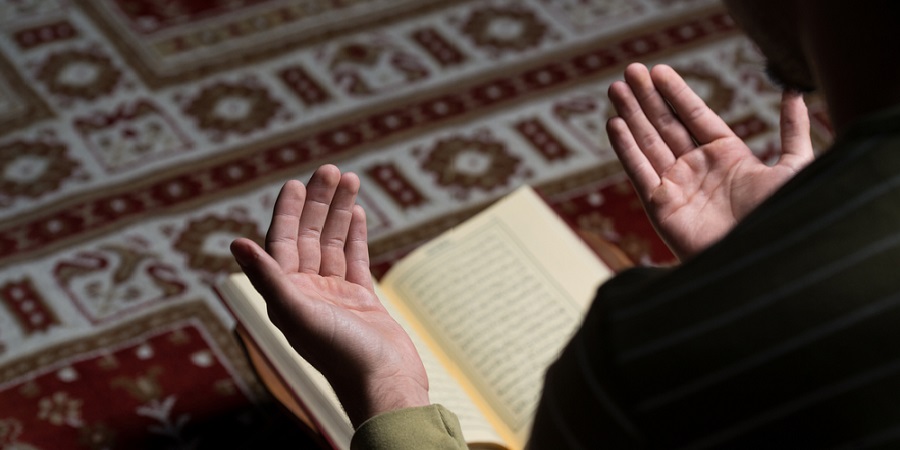A person repents for his misdeeds when he wants to ameliorate his wrongdoings with strong determination. Tawbah is an Islamic concept of repentance to Allah for performing any kind of sins or wrongdoings. A Muslim has to repent when he/she performs or does anything that is forbidden in Islam, for example catastrophic sins like adultery, consuming riba/interest or murder. One can speak to Imams to find out how to repent in Islam and then return to what is instructed by Allah.
In the Quran and Hadiths, the word tawbah (to return) is focused and it means to turn from evil and unholy activities and firmly avoid them in the future. It plays a main role in the flourishing of a human soul and its journey towards Allah. Prophet Muhammad (PBUH) narrated that God says “As soon as My servant makes a step toward Me, I make two steps toward him; as soon as he comes to Me walking, I come to him running”. It is believed that a believer can make tawbah not only when he/she commits a sin but also while executing a good deed. The tawbah signifies true-hearted and devoted repentance that is free from sanctimony and insincerity.
Tawbah Meaning
The literal meaning of Tawbah is ‘to return’. The word is mentioned many times in the holy Quran and several hadiths. In the holy Quran, Tawbah is related to the word ‘Nasuh’, which means to ‘make pure’ or ‘sincere’. It can be understood that Tawbah helps in returning from sinful and wrong deeds. The person performing Tawbah surrenders in front of the Almighty Allah and asks forgiveness from Him for their act of swaying away from the path of righteousness.
Importance Of Repentance In Islam: Quran Verses
According to the Islamic scripture Quran, those who believe that they have conducted any wrongdoing or misdeed that is against the commandments of Allah, can sincerely repent for their mistake and seek Allah’s forgiveness. The Quranic verses say,
“And O ye Believers! turn ye all together towards God, that ye may attain Bliss.” — Quran, Sura 24 (Al-Noor), ayah 31
“O ye who believe! Turn to God with sincere repentance, in the hope that your Lord will remove from you your ills and admit you to Gardens beneath which Rivers flow.” — Quran, Sura 66 (Al-Tahrim), ayah 08
“Surely God loves those who turn much (to Him), and He loves those who purify themselves.” — Quran, Sura 02 (Al-Baqara), ayah 222
“God accepts the repentance of those who do evil in ignorance and repent soon afterwards; to them will God turn in mercy: For God is full of knowledge and wisdom. Of no effect is the repentance of those who continue to do evil, until death faces one of them, and he says, “Now have I repented indeed;” nor of those who die rejecting Faith: for them have We prepared a punishment most grievous.” — Quran, Sura 04 (An-Nisa), ayah 17–18
Suggested Read: Friday Blessings: The Sweet Reward Of Friday Prayers In Islam
The Quran verses also address the doubter and request them to turn towards Allah and seek his mercy and forgiveness.
“The Penalty on the Day of Judgment will be doubled to him (disbeliever), and he will dwell therein in ignominy,- unless he repents, believes, and works righteous deeds, for God will change the evil of such persons into good, and God is Oft-Forgiving, Most Merciful. And whoever repents and does good has truly turned to God with an (acceptable) conversion.” — Quran, Sura 25 (Al-Furqan), ayah 69–71
How To Repent In Islam: Conditions
According to the Sharia (the Islamic law), when a person performs tawbah with sincerity and devotion, Allah accepts it. The tawbah comprises six elements:
6 steps of Repentance
- To remorse one’s evil deed;
- To carry out saintly duties that were overlooked;
- To return the rights and properties obtained from others unfairly;
- To seek forgiveness from people you have wronged;
- To take responsibility for avoiding the wrongdoing in the future; and
- To retain himself/herself in Allah’s acquiescence.
Tawbah is a double-edged technique, according to which a person should be able to acknowledge his/her mistake and abandon it to seek Allah’s forgiveness. Prophet Muhammad (PBUH) said,
“A believer sees his sins as if he were sitting under a mountain which, he is afraid, may fall on him; whereas the wicked person considers his sins as flies passing over his nose and he just drives them away like this (and he moved his hand over his nose).” — Sahih al-Bukhari, 8:75:320
How To Perform Salaat Al-Tawbah
Salaat al-tawbah is the special tawbah prayer for those who want to repent. It consists of four rakahs (according to Shia tradition) and must be performed in a prescribed method. Irrespective of the gravity of the sin committed, the repentance prayer remains the same. The prescribed way of offering Namaz-e-tawbah is as follows:
Niyat For Salatul Tawbah
Before offering Salatul Tawbah, one must make Niyyah. Niyat or Niyyah is the intention to declare that one is aware of their sins and sincerely wants to amend their wrongs by asking forgiveness from the almighty Allah.
Niyyah for Tawbah Dua: Usolli Sunnata Taubati Rak’ataini Lillahi Taala.
Meaning: I pray the sunnah of tawbah for two rak’ahs because of Allah Ta’ala.
Salat al Tawbah Steps
- Perform Ghusl, here it is important to submerge the whole body in water (called Irtimasi). If you are not in a place where you can get into the water completely, you may do it in parts.
- Alternatively, you can also perform Tartibi, which is wiping the body with water. This is suggested in place water available for the ritual is scarce.
- The next step is to perform Wudu, an Islamic cleansing ritual
- Then perform a four rakah prayer and in every rakah, one must recite the Surah al-Fatiha once, Surah al-Ikhlas thrice, Surah al-Falaq once, and Surah an-Nas once.
- Next, one must recite Astaghfirullah (rabbi wa atubu ‘ilayh)
- After the prayer, say Astaghfirullah rabbi wa atubu ‘ilayh
- Follow it up with the following prayers:
i) Laa hawla wa laa quwwata illa billaahil a’liyyil a’zeem; and then
ii) Yaa A’zeezo yaa ghaffooro ighfirli zunoobi wa zunooba Jamee’il mo-mineena wal mo-minaate. Fa innahu laa yaghfiro illa ant.
Salat Al Tawbah Dua
While offering the tawbah prayer for repentance, the only condition is one has to pray from their heart; understanding the severity of their sin. However, if one is stuck on the supplication to recite, here is a special Tawbah dua for seeking forgiveness from the all-merciful Allah.
Dua: Allahumma inni Zholamtu Nafsi Zull-man Kasiran Walaa Yagh-firu Zunuuba illa Anta, Fagh-firli Min indika Magfirotan innaka Antal Rgho-fuu Rur-rahim.
Meaning: O Allah, indeed, I have wronged myself with great injustice. And no one can forgive my sins except You. So forgive me with great forgiveness from Your side. You are indeed Oft-Forgiving, Most Merciful.
Mentioned in Hadith Bukhari, Prophet Muhammad (PBUH) acknowledged Sayyidul Istighfar as the most superior supplications for repentance.
Dua: Allaahumma Anta Rabbii Laa ilaaha illaa Annta Kholaq-tanii Wa Anaa ‘Abduka Wa Anaa ‘Ala ‘Ahdika Wawa’ Dika Maas-tatha-tu ‘Auudzu-bika Min Syarrimaa Shana-tu AbuuU-laka Bini’matika Alayya Wa AbuuU Bidzanmmbi Fagh-fir-lii Fa-innahu Laa Yagh-firudz-Dzunuuba Illaa Annta.
Meaning: O Allah, You are my Lord, there is no God but You, You have created me, and I am Your servant. I will indeed obey Your provisions, Your promises according to my ability. I ask for Your protection from the evils of all my deeds, and I acknowledge all the favors You have given and acknowledge the existence of the sins I have committed. No one forgives sins except you.
Benefits of performing Tawbah
As performing Tawbah is a sign of immense trust and faith in Allah and His mercy, Allah blesses the people who seek forgiveness with pure intent. The whole act of Tawbah makes one humble and helps remove anxiety, worries and distress. Tawbah imparts peace as sinners accept their sins with pure objective and promise to never commit the same mistakes again. The faith further guides the person on the path shown by Allah that is of righteousness. Tawbah also generates a sense of kindness and humility when others sins against an individual or a community.
Repentance is the way to seek forgiveness for your sins from Allah. Turning off or delaying tawbah is absolutely unjustifiable in Islam. If a person delays or reschedules repentance till the last breath, repentance will not be welcomed by Allah and will be considered as a great misdeed. It is therefore recommended that whenever a person realises his folly, they must repent and seek forgiveness from the all merciful Allah. To get the sins forgiven, one must follow accurate steps on how to repent in Islam but what matters the most is intent.
Suggested Read: The Day Of Arafat: Importance Of Fasting, Making Dua, Things To Do, Hadiths
Tawbah/Repentance In Islam FAQs
What are some of the unforgivable sins in Islam?
There are some of the catastrophic sins that are unforgivable in Islam. Some of them are taking false vows, breaking a vow, disrespecting or disobeying parents, withholding water from others and the crime of adultery.
What are the major misdeeds in Islam?
The major misdeeds in Islam are shirk, magic, consuming riba/interest, seizing the property of an orphan, murder and adultery.
What is Zina in Islam?
In Islam, Zina means adultery or extramarital affair.
Can you repent after you die?
There is no effect of repentance for those who pursue evil throughout their life and don’t have faith in Allah.
Will Allah forgive our sins?
Muslims believe that if they are kind and helpful to others and have repented for their sins, Allah will exonerate them as he is merciful, forgiving and compassionate.
What are the benefits of performing Tawbah?
It helps a person lead on a righteous path of faith in Allah.
What are the four steps/stages of repentance?
The four stages of repentance include: i) To feel regret for a bad deed and to perform saintly duties which were ignored. ii) To return the rights and property that were wrongly taken from others iii) To ask for forgiveness from whom you have harmed. iv) To take responsibility for stopping the wrongdoing in future and maintain yourself in acceptance of Allah.
How to do Tawbah prayer?
Tawbah prayers steps are as follows:
- Perform Taribi, which is cleaning body with water
- Perform Wudu, an islamic purification ritual
- Perform four rakah prayers; Surah al-Fatiha (once), Surah al-Ikhlas (thrice), Surah al-Falaq (once), and Surah an-Nas (once).
- Then perform Astaghfirullah prayer
- Then recite Astaghfirullah rabbi wa atubu ‘ilayh’ and then perform the remaining prayers.










